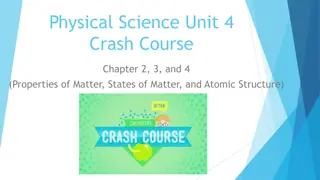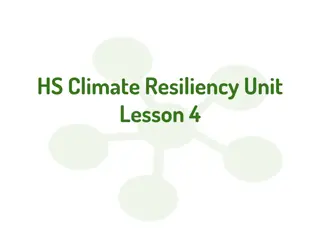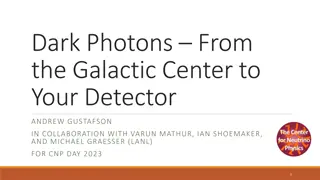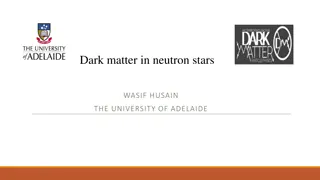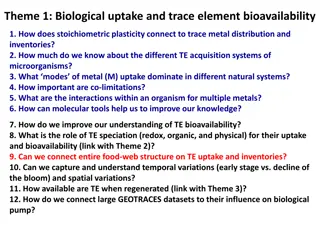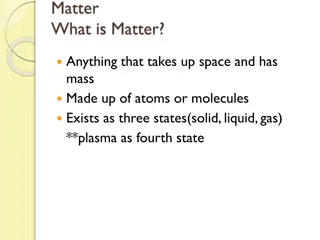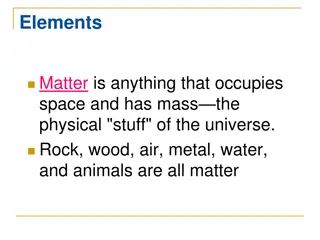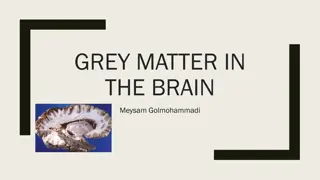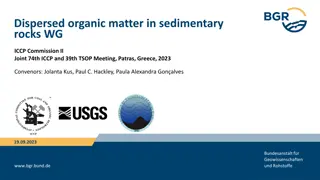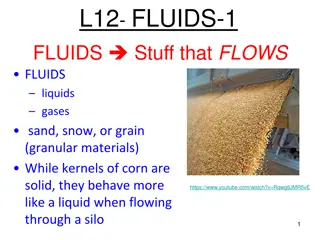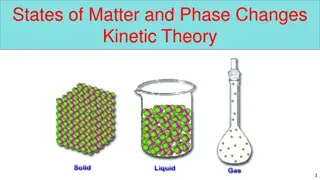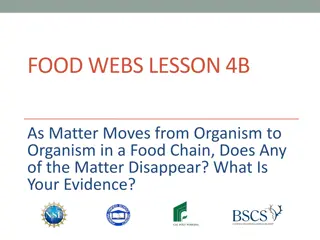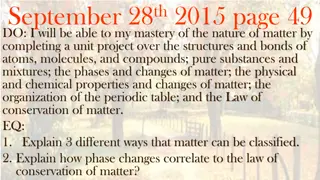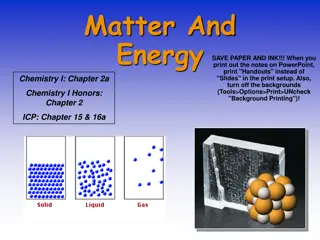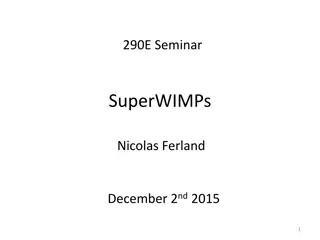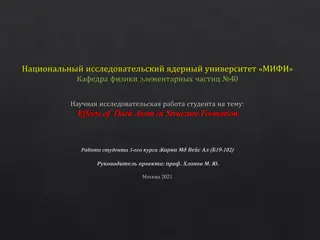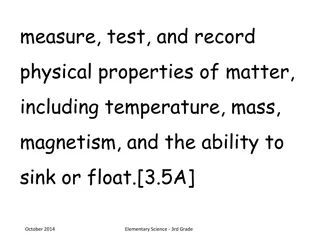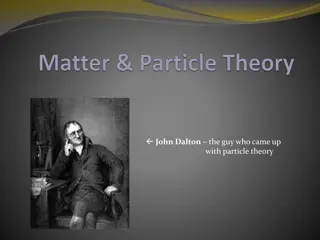Dark Matter Search with ATLAS: Active Learning Application
Explore an active learning application in the search for dark matter using ATLAS PanDA and iDDS. Investigate Beyond Standard Model physics parameters related to Hidden Abelian Higgs Model and New Scalar with a focus on cross-section limit calculations. Understand the process for generating Monte Car
0 views • 16 slides
Introduction to Chemistry: Matter, Energy, and Measurement
Chemistry is the study of matter, its properties, and the changes it undergoes. This content covers the basics of chemistry, including the classification of matter into pure substances and mixtures, different states of matter, and the building blocks of matter such as atoms and molecules. Sample exe
5 views • 51 slides
Understanding Chemistry: Exploring Elements, Matter Phases, Bonds, Conservation, and Nuclear Structure
Explore the world of chemistry through studying atomic structure, matter phases, bonding of atoms, conservation of matter, and nuclear structure changes. Use the Periodic Table to analyze elements, understand properties of compounds, investigate chemical reactions, and assess nuclear energy applicat
10 views • 10 slides
Understanding Properties and States of Matter in Physical Science
Matter is made up of elements that cannot be broken down further. Different mixtures have distinct properties, such as solutions, colloids, and suspensions. Physical properties like viscosity and density can be observed without changing the material's composition. Chemical properties, like flammabil
2 views • 15 slides
Money Laundering Offences and Investigations in Bangladesh
Bangladesh's Financial Intelligence Unit can authorize investigation agencies to investigate predicate offences, but who will investigate money laundering offences? The Money Laundering Prevention Act, 2012 outlines penalties and forfeiture of property for such offenses. Entities such as banks, fina
0 views • 12 slides
Liability of Police for Failing to Investigate: DSD v Commissioner of Police for the Metropolis
Victims of crimes may have the right to sue the police for failing to investigate, as seen in the case of DSD and NVB, victims of John Warboys. The duty to investigate may arise when there is state complicity or private crime, with a positive obligation under Article 3 to protect individuals. The in
0 views • 26 slides
Understanding Matter in Our Surroundings
Matter in Our Surroundings discusses the classification of matter, physical nature of matter, and the properties of matter particles such as size, space between them, and continuous movement. It explains how matter is made up of particles and how they interact with each other through various activit
0 views • 27 slides
Understanding Climate Resiliency and Greenhouse Gases in High School Lessons
In this high school climate resiliency unit lesson, students explore the concept of albedo and its impact on temperature changes. They investigate factors affecting temperature, calculate temperatures based on albedo, and delve into understanding greenhouse gases and their contributions to climate c
0 views • 16 slides
Unveiling Dark Matter Mysteries Through Dark Photons
Delve into the exploration of dark matter through the lens of dark photons in the galactic center and detectors. Uncover the enigmatic nature of dark matter, its interactions, existing constraints, and our model with fermionic dark matter and a dark photon mediator. Discover strategies to evade cons
0 views • 18 slides
Exploring Neutralino Dark Matter Mass Limits
Hajime Fukuda, along with researchers Shirai and Luo, conducted a study on the maximum mass of Neutralino dark matter particles. They investigated coannihilation effects and how colored sparticles can enhance LSP annihilation. The study delves into the implications for TeV-scale supersymmetry models
0 views • 39 slides
Exploring Solids and Properties of Matter
Dive into the world of solids and properties of matter, from seating arrangements to classroom objectives. Discover the different phases of matter, investigate properties of solids, liquids, and gases, and explore the interactions between particles. Engage in hands-on activities and learning experie
0 views • 105 slides
Exploring Quarkyonic Matter and Chiral Pairing Phenomena
Investigate the characteristics of quarkyonic matter and chiral pairing phenomena in the context of dense QCD at T=0. Delve into the confinement aspects, the properties of quarkyonic matter near T=0, and the candidates for chiral symmetry breaking. Consider the implications of chiral pairing phenome
0 views • 42 slides
Exploring Dark Matter in Neutron Stars
Investigate the interaction of dark matter within neutron stars, comprising approximately 25% of the universe's total matter. The nature of dark matter assumptions, its distribution within neutron stars based on fermionic or bosonic properties, and the implications for self-interacting fermionic and
0 views • 22 slides
Understanding Matter and its Classification in Chemistry
Matter is defined as anything that occupies space and has mass. It can be classified into solids, liquids, and gases, as well as pure substances and mixtures based on their composition. This overview covers the states of matter, Aristotle's four elements theory, and the classification of matter into
0 views • 13 slides
Searching for Dark Photon Dark Matter with Cosmic Ray Antideuterons
Exploring the use of cosmic ray antideuterons for dark matter detection is a promising avenue in astrophysics. Antideuteron searches offer a low-background environment, making them ideal for detecting certain types of dark matter particles. Unlike antiproton searches, which face significant backgrou
0 views • 30 slides
Understanding Biological Uptake of Trace Elements in Natural Systems
Explore the connection between stoichiometric plasticity and trace metal distribution, investigate microbial acquisition systems, analyze modes of metal uptake, and address co-limitations and interactions within organisms. Utilize molecular tools to enhance knowledge on trace element bioavailability
0 views • 5 slides
Understanding States of Matter and Kinetic Theory
Matter is anything that occupies space and has mass, existing in solid, liquid, gas, and plasma states. The states of matter depend on the arrangement and motion of atoms. Solids have fixed shapes, liquids take the shape of their container, and gases fill the volume of their container. The Kinetic T
0 views • 18 slides
Exploring the World of Matter and Elements
Matter is the physical "stuff" of the universe, encompassing elements that make up rocks, wood, air, metals, water, and living organisms. Chemical elements are the building blocks of matter, with essential elements like oxygen, carbon, hydrogen, and nitrogen constituting a significant part of living
0 views • 24 slides
Exploring Matter and Physical/Chemical Changes in Science Class
Delve into the world of matter and its transformations through engaging activities such as classifying elements, compounds, and mixtures using nuts, bolts, and washers. Understand the concepts of mass, space, and the different types of matter through hands-on learning experiences in this interactive
0 views • 31 slides
Understanding Gray Matter in the Brain: Structure, Function, and Importance
Gray matter in the brain plays a crucial role in information processing and cognitive functions. Composed of neuronal cell bodies and unmyelinated axons, gray matter is visibly pinkish-gray and is essential for various brain functions. It forms a synaptically dense area with fewer cell bodies compar
0 views • 7 slides
Dispersed Organic Matter in Sedimentary Rocks - Review Paper for Geological Application Studies in the 21st Century
The WG on Dispersed Organic Matter in Sedimentary Rocks is working on a review paper focusing on application studies of dispersed organic matter (DOM) within a geological context. The paper aims to provide an insightful overview titled "Applications of Dispersed Organic Matter Petrology in the 21st
0 views • 18 slides
Understanding Matter: Solids, Liquids, Gases, and Fluids
Matter exists in various states - solid, liquid, gas, and fluid. Solids have atoms closely packed, liquids have more freedom but still cohesion, gases have atoms spread out, and fluids flow like liquids or gases. Mass density characterizes matter based on atom proximity. Gas pressure results from mo
0 views • 22 slides
Future Prospects in Dark Matter Research at Fermilab
Exploring new avenues in the realm of dark matter research, Fermilab stands at the forefront with potential upgrades to their detectors, such as the LZ and PICO-X. The presentation delves into the scientific criteria influencing the choice of detectors, the pursuit of understanding dark matter and d
0 views • 6 slides
Understanding Properties of Matter in the Matter and Change Unit
Exploring matter, mass, weight, volume, and states of matter in the context of physical properties and compositions of substances. Discover how substances differ, the importance of uniform composition in materials, and the distinction between substances and mixtures.
0 views • 23 slides
Understanding Matter: States, Properties, and Changes
Matter is anything with mass and volume, existing in solid, liquid, or gas states. The Kinetic Molecular Theory explains the behavior of particles in matter. Chemistry explores matter through chemical and physical changes. Different factors, like temperature, can change the state of matter. Physical
0 views • 6 slides
Understanding Matter: Properties and Changes
Matter is anything that has mass and volume. This includes the concepts of mass, volume, chemical changes, temperature effects, particle model, kinetic molecular theory, and describing matter based on physical properties. Learn about different states of matter, such as solids, liquids, and gases, an
0 views • 9 slides
Understanding Kinetic Theory of Matter and Phases
Explore the fundamental concepts of the Kinetic Theory of Matter, including the three pillars of kinetic energy and forces of attraction, which determine the states of matter like solid, liquid, gas. Learn about temperature, phase changes, and the phases of matter, emphasizing the role of kinetic en
0 views • 17 slides
Exploring Food Chains: Does Matter Disappear Along the Way?
In this lesson on food chains, students investigate whether matter disappears as it moves from one organism to another. Using a linking-cube simulation, they track food molecules mathematically to determine if any matter is lost in the process. The lesson involves hands-on activities and observation
0 views • 30 slides
Exploring the Nature of Matter: Unit Project Overview
Embark on a journey to understand the structures and bonds of matter through a comprehensive unit project. Delve into atoms, molecules, compounds, pure substances, mixtures, phases of matter, properties, periodic table, and conservation laws. Explore matter classification and phase changes' relation
0 views • 9 slides
Introduction to Chemistry and Matter
Understanding chemistry involves studying the properties of matter and its changes. Matter is anything that occupies space and has mass, composed of vibrating atoms. It includes examples like air, water, books, desks, and people, while non-examples are light, sound, thoughts, and emotions. Physical
0 views • 18 slides
Understanding Matter and Energy in Chemistry: A Comprehensive Overview
Exploring the intricate nature of matter, this collection delves into the fundamentals of chemistry, from the macroscopic to the particulate level. Covering topics such as the states of matter, kinetic nature, physical properties, and other states of matter like plasma and Bose-Einstein condensate,
0 views • 18 slides
Exploring Matter and its Properties
Matter is the fundamental component of everything around us, existing in various forms such as solids, liquids, and gases. This article delves into the states of matter, chemical changes, physical changes, and the kinetic molecular theory, shedding light on the basic building blocks of life and the
0 views • 8 slides
Exploring the Mysteries of Dark Matter and SuperWIMPs
Dark matter, detected only gravitationally, poses enigmatic characteristics and poses challenges in direct detection. Scientists search for interactions with particles, explore hypothetical undetectable forms, and consider production mechanisms. SuperWIMPs like NLSP and NLK decay into Dark Matter, k
0 views • 16 slides
Understanding Matter and Its Changes
Matter is anything that has mass and takes up space. By identifying physical properties and understanding physical changes, we can explore the different states of matter - solid, liquid, gas, and plasma. Measuring properties like length, mass, volume, and density helps us characterize and differenti
0 views • 24 slides
Exploring Dark Atom Effects on Structure Formation in the Universe
Overwhelming evidence points towards the existence of dark matter in the universe, with various theoretical models such as OHe atoms and Glashow's EIMP model proposed to explain its nature. Dark OHe atoms, consisting of 2 charged particles bound with primordial He nuclei, offer a unique perspective
1 views • 8 slides
Dark Matter Search at Terascale Meeting in Strasbourg
Doojin Kim presents research on non-relativistic dark matter search, focusing on weakly interacting massive particles (WIMPs) and generic boosted dark matter (BDM) signatures at the Terascale Meeting in Strasbourg. The study explores various scenarios and production models for detecting elusive dark
0 views • 24 slides
Negative Credit Score Factors: Understanding Credit Scores and Their Impacts
Investigate the various options that CreditQ offers to improve your credit score and see if any of them meet your needs. Individuals are strongly encouraged to investigate the possibility of obtaining expert assistance to effectively improve their cr
0 views • 8 slides
Exploring Physical Properties and Energy in Elementary Science
In this elementary science curriculum, students engage in hands-on activities to measure and record physical properties of matter, classify matter as solids, liquids, and gases, predict state changes, explore mixtures, study different forms of energy, demonstrate forces, learn about soil formation,
0 views • 21 slides
Understanding the Particle Theory of Matter
Matter, as described by the Particle Theory, is composed of tiny particles in constant motion with spaces between them. This theory, formulated by John Dalton, explains the behavior of matter based on four principles. It elaborates on the structure, motion, and interactions of particles within subst
0 views • 19 slides
Revealing the Dark Matter Profile of the Milky Way
Xiaowei Ou and collaborators aim to infer the dark matter profile of the Milky Way by measuring its circular velocity curve. By utilizing stellar tracers and data-driven models for precise distances, they seek to improve our understanding of dark matter distribution in our galaxy. Their research inv
0 views • 54 slides



